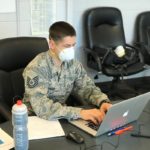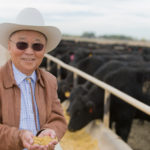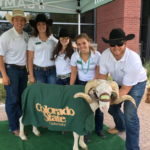The war in Ukraine permeates the media in the United States with images of destroyed buildings and millions of people fleeing into neighboring countries. Often the most affected but least visible members of refugee families are their pets.
As in the U.S., an estimated 60 to 70% of Ukrainians own pets, and when they flee a war zone, their pets go with them. If refugees can make it into a neighboring country, beloved family pets face abandonment at the border unless their owners can secure a pet passport. Required by European Union Member States and signed by an authorized veterinarian, the passport confirms that dogs, cats, and ferrets have been vaccinated against rabies and tapeworm and are microchipped.
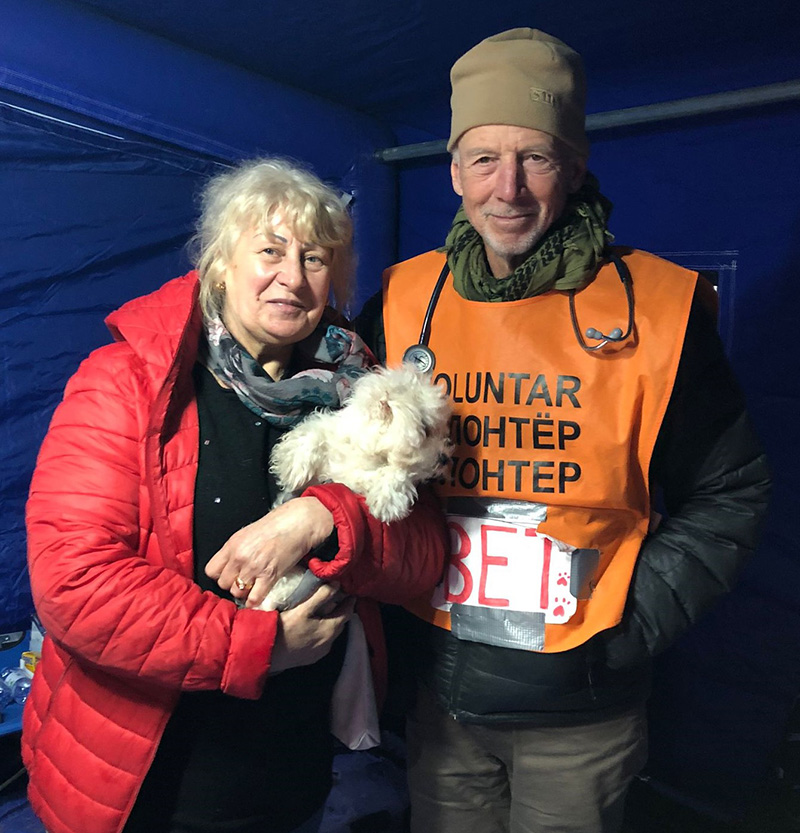
Assisting with that effort in March 2022 is the reason internationally renowned veterinarian Dr. Jon Geller (D.V.M., ’95) flew to Romania for 12 days. Working with several relief organizations and three veterinarians from Croatia, the team set up a vet check station located at the southeast Romania-Ukraine border where refugees were ferrying crossing the Danube River. They also assisted with the adoption of abandoned pets.
During Geller’s stay, they examined hundreds of animals at all hours of the day and night. After he left, other Colorado State University veterinary students and D.V.M. alumnae helped staff the border station for an additional three months.
“The refugees from Ukraine are all homeless and they are very stressed out about life,” Geller said. “That’s one of the reasons we were there, because of the common denominators to homeless in the U.S.”
The Street Dog Coalition
Helping people experiencing homelessness with their pets is something Geller knows plenty about. In 2014 he founded The Street Dog Coalition, which is committed to protecting the human-animal bond by providing free medical care and related services to pets of people experiencing, or at risk of, homelessness. The organization’s first street clinic was held in Fort Collins in May 2015 and cared for 30 pets. SDC’s model of care has been so successful that the organization’s street clinics are now conducted in more than sixty cities across the U.S.
“The families of people living on the streets have often rejected them, they have no friends, and the situation is very dysfunctional,” Geller said. “But because their pets give them unconditional love, they form really strong bonds with them.”
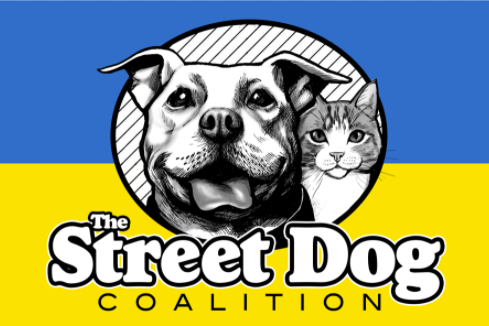 Geller estimates that in the U.S. there are between 100,000 and 150,000 people living on the streets with pets, most of which are dogs but about 10% are cats. “With enough teams spread across the country, we can probably provide basic care for all of them,” he said. “Personally, I am more overwhelmed by the human side of homelessness and seeing people struggle. We talk about taking care of both ends of the leash, and I’ve come to realize that the bigger challenges are with the pet owners, who are often dealing with major medical issues, mental health and addiction disorders, and a lack of housing and transportation. All of which are much harder to address.”
Geller estimates that in the U.S. there are between 100,000 and 150,000 people living on the streets with pets, most of which are dogs but about 10% are cats. “With enough teams spread across the country, we can probably provide basic care for all of them,” he said. “Personally, I am more overwhelmed by the human side of homelessness and seeing people struggle. We talk about taking care of both ends of the leash, and I’ve come to realize that the bigger challenges are with the pet owners, who are often dealing with major medical issues, mental health and addiction disorders, and a lack of housing and transportation. All of which are much harder to address.”
In response, SDC has embraced the One Health model that operates on the belief that humans, animals, and the environment are inextricably linked, and better outcomes are achieved by collaboratively working with physicians, dentists, public health and housing officials, food pantries, homeless shelters, etc., for the optimal health of all species within a community.
“People will get medical care for their pets before they get it for themselves,” Geller said. “So, we’re a bridge, an entry point for additional services. While we see their pets, we say, ‘Why don’t you get a health screening so you can continue taking care of your pet.’”
To clarify the scope of their operation and facilitate fundraising, SDC has established programs to address specific issues such as female pet owners experiencing homelessness, the needs of veterans, pet surgeries at animal hospitals, and hosting street clinics in underserved rural communities in Colorado.
In recognition of Geller’s efforts on behalf of pets and the people experiencing homelessness, the Colorado Veterinary Medical Association name him Veterinarian of the Year in 2019.
Returning to Eastern Europe
In March 2023, Geller plans to visit Ukraine. SDC’s International program purchased and equipped a mobile veterinary hospital housed in a 25-foot trailer for $160,000. The plan is to travel around Ukraine for most of this year providing medical care to an estimated 10,000 pets in the country and assisting with the adoption of abandoned animals.

Many pets in Ukraine and throughout Europe are not spayed or neutered. Consequently, shelters throughout the area are overwhelmed and unable to take more animals, and those roaming free in Ukraine are suffering from starvation, predation, and being killed by cars and military vehicles.
Worldwide Vets, headquartered in the United Kingdom, is running the mobile hospital operation and SDC’s Operation Ukraine is committed to covering the monthly expenses, most notably medical supplies and fuel. Although the team plans to avoid war zones and military operations, the words “Vet Clinic” are emblazoned on the top and sides of the trailer to hopefully prevent war-related incidents. No CSU vet students will be part of this endeavor and a security team may need to accompany the team.
“Figuring out those kinds of logistics is a whole new world for me,” said Geller. “Fortunately, I am working with a really good team.” That team includes Katrina Weschler (M.A., ’19), who started with SDC as a volunteer in 2018 and is now the organization’s executive director.
In October 2022, Geller received the prestigious Henry Bergh Award from the American Society for the Prevention of Cruelty to Animals. In ASPCA’s award video, Weschler said: “The world is tough, current affairs are scary, and it almost feels overwhelming. And Jon is the one who says, ‘we’ve got to do something.’ And he does it, and people follow, and then there’s positive change, and it doesn’t feel so impossible after all.”
* * * *
Learn more about The Street Dog Coalition.







































